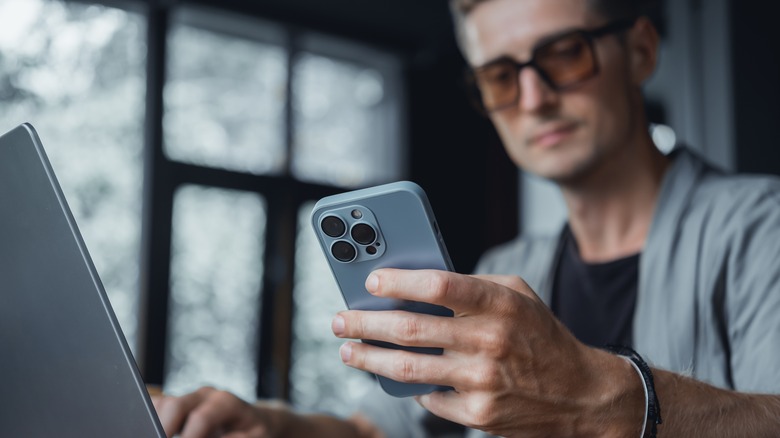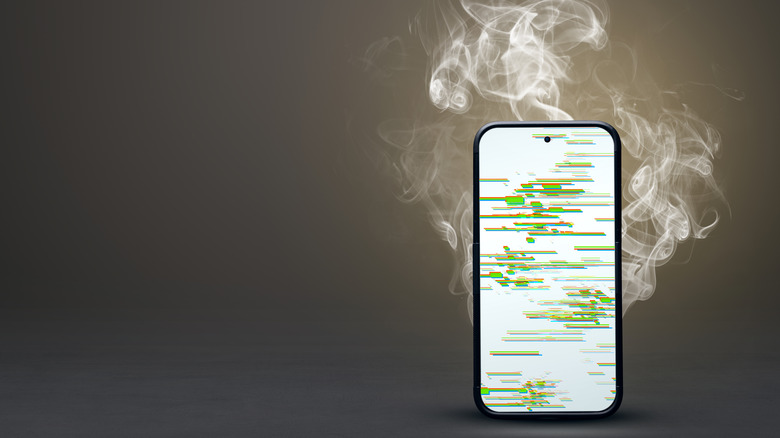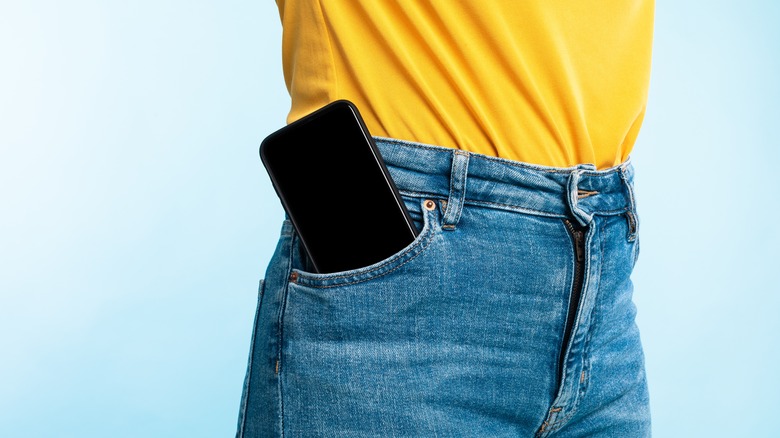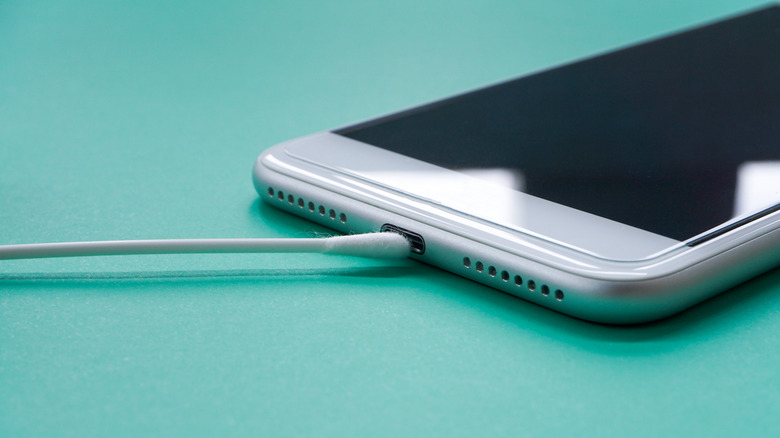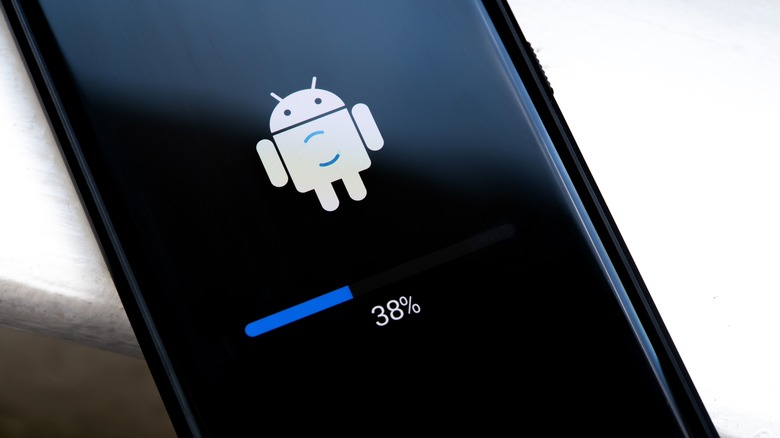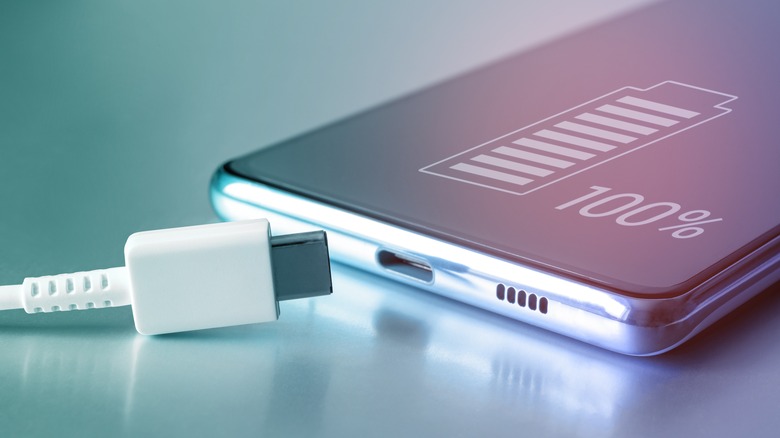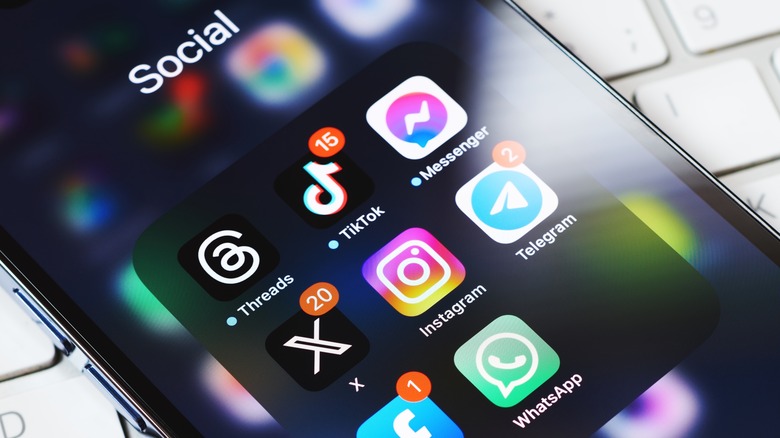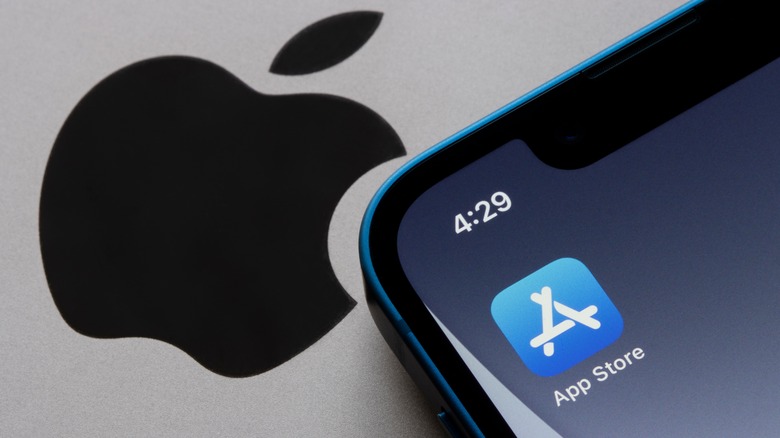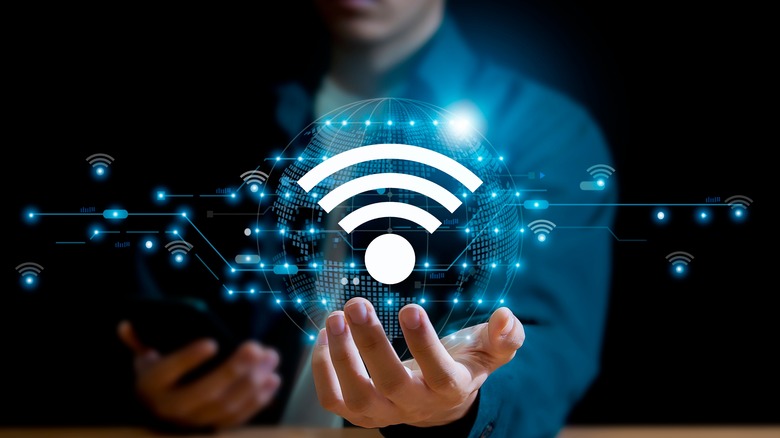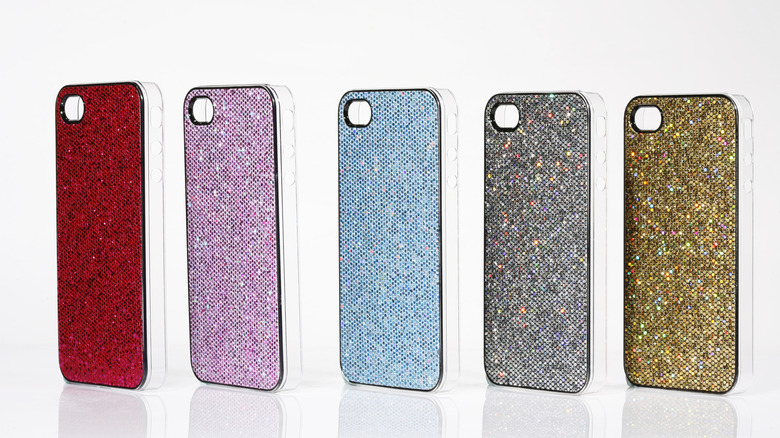10 Huge Mistakes That Could Be Damaging Your Smartphone
It's amazing to think of how radically smartphones have changed the world. It wasn't that long ago people were virtually unreachable once they left their homes. Now, pretty much everyone has some kind of device on them where they can receive calls, send messages, and check on social media accounts to stay up-to-date on everything going on in the world. But since the technology is still relatively new, it's understandable there's quite a bit that people don't understand about what they have in their purse or pocket. And they may inadvertently set themselves up for disaster.
There are several daily habits that could be shortening the lifespan of your phone. A surprising number of people say they upgrade their smartphone every year or two, but some prefer to hang onto theirs for as long as possible. If you want to increase your chances of sticking with the same phone for an extended period of time, you need to be careful about how you use it. Everything from charging your phone to where you decide to store it can have long-ranging consequences.
Of course, no two phones are the same. Even if you insist that any of the following hasn't damaged your phones too badly in the past, it doesn't mean they're things you should continue doing. Making your phone last just a little bit longer can save you some money and plenty of headaches, so keep these tips in mind.
Allowing your phone to overheat
You can tell your computer is overheating when the fans start running excessively to cool it down. This is essential so that internal components don't become damaged by the heat. The same thing can happen to your phone, and you've probably noticed the device feeling hot when you're performing a task that requires a lot of processing power. It gets even worse if you're in a hot climate or leave your phone in direct sunlight — like on a desk next to a window.
The main issue with overheating is that it can warp you smartphone's parts. Though this is manageable to a degree, you're in real trouble if the heat hurts your phone's battery — this will affect how much charge your phone can hold. In rare cases, phones have even been known to catch fire or partly explode as a result of gasses from the lithium-ion battery leaking out.
Your phone will feel warm occasionally, and if it's performing some major task like restoring its data from a backup, there's typically no reason to worry. However, you should be concerned when it feels genuinely hot, as it likely means other factors are at play. The easiest way to stop your phone from overheating is to make sure it's not exposed to direct sunlight. Additionally, don't leave it in a car on a hot day while you run errands. Remember: A smartphone is a delicate device and should be treated as such.
Storing it improperly in your pocket
It seems natural to carry your phone in your pocket, especially if you don't have a purse. But even though it's convenient, it's crucial to be mindful of how you carry to phone. There's a big myth that smartphones can lead to an increased risk of cancer, although that's been thoroughly debunked (distracted driving is more dangerous). But you should still think twice about keeping your phone in your pocket all day long.
For starters, there's the trend of people keeping their phones in their back pockets. It seems odd to do this since sitting on it could cause it to crack or bend. This practice could also lead to health problems, as sitting on anything presents a risk of sciatica pain. Phones aren't even necessarily safe in the front pockets, especially for someone wearing particularly tight pants. Kneeling or bending over may apply just enough pressure to cause some damage. Plus, certain actions could inadvertently harm your phone, such as dropping your pants to the floor while the phone's still in a pocket.
If you can keep your phone in another storage device, like a purse or backpack, it's probably safer there. Ultimately, it's good to be mindful that a smartphone isn't a toy. If it breaks, it could cost you hundreds of dollars to fix or replace.
Never shutting your phone down
The idea of being without a smartphone for even a few minutes is enough to fill plenty of people with anxiety. Many users don't even shut their phones down overnight because they use them as alarms to wake up. However, much like you need sleep to feel recharged, your phone needs breaks every so often, which is why you should shut your phone down at least once a week.
When a phone is left on too long, it can experience performance issues, like slower speed and reduced battery life. Most smartphones can only go through so many charge cycles before they begin to degrade, and regular breaks can prolong that efficiency. You don't even have to go without your phone for very long to start seeing benefits. Shutting your phone off for just a few minutes before turning it back on helps clear the cache so that everything has a better chance of working optimally. You might even want to invest in a separate alarm clock so you can turn your phone off at night.
Cleaning your phone's cavities yourself
Your smartphone has many complex components, and there are several openings where dirt and debris can wreak havoc. For example, you may find that when you plug in your phone to charge it, the cable doesn't go in all the way. The phone may have difficulty charging, and this is likely due to something in the port that's preventing a proper connection. It may seem simple enough to use a paper clip or toothpick to scrape out any debris, but this could cause even more problems.
You should avoid using certain products when cleaning your iPhone, such as compressed air. The force of the air could damage internal components like the microphone, which is far more complicated to repair. Something similar can happen if you attempt to scrape out lint in a port with a pointed object — it could damage fixtures that are necessary for your phone's operation. While there's no shortage of online anecdotes from people who manage to clean ports themselves with sharp items, it's better to be safe than sorry.
Anyone with an iPhone or Samsung can bring their device to an Apple Store or book an appointment at a Samsung Support Center and a worker can use a specialized tool to get any litter out free of charge. If that doesn't fix your issues, the employee can address other potential problems hampering your device.
Ignoring software updates
Earlier, we mentioned how some people get anxious when they can't use their phone for a lengthy period of time. This can make software updates a dreaded affair, as the phone becomes unusable for a little bit so that it can update its systems. It's easy to ignore these updates, but you should never go too long without getting the newest update. This could open you up to a host of security threats and issues that'll make you wish you'd spent just a few minutes to get it up-to-date.
A lot can happen when you don't update your Android phone or iPhone. On the most basic level, you miss out on the newest nifty features that can make using your smartphone all the more enjoyable. However, these updates also often come with necessary security upgrades. Technology constantly evolves, and vulnerabilities within a previous patch for your phone might be uncovered. A software upgrade can fill in those gaps so that you're better protected. By not updating as soon as possible, a nefarious force could target your phone by taking advantage of its vulnerability.
Apple makes it easy to update smartphones since there's an option to perform the software update at night, as long as the phone is charging and connected to Wi-Fi. You receive the latest protections without having to go without your phone for a few minutes because you'll probably be sleeping anyway.
Charging your phone too often
It may seem odd for Apple to tell iPhone users to leave their phones charged overnight for software updates, seeing as numerous outlets have warned against it for fear of damaging the phone's battery. While overcharging an iPhone battery was a concern in the past, it's not really possible nowadays. Newer iPhones have overcharging protections to prevent deterioration of the battery when charged for extended periods. However, folks aren't completely out of the woods with this issue yet, and there are still considerations to bear in mind.
In 2023, Samsung released an article stating how it still doesn't recommend you keep your phone plugged in for too long. "Keep in mind that charging your battery up to 100% too frequently may negatively impact the overall lifespan of the battery," the company wrote. The primary concern here is that overcharging can result in overheating, which as we mentioned can damage certain phone components, including the battery. While iPhones appear to be a bit safer in this department, there's still the worry of "trickle charge," which is — when a phone will fluctuates from 100% charge to slightly below it. This means it starts charging again, which can also lead to overheating.
If you're concerned about your phone's charging capabilities, go into "Settings" and make some adjustments — and check if the battery has degraded enough to warrant a replacement. From here, iPhone users select "Battery" then "Battery Health & Charging." If you're an Android user, select "Battery and Device Care," then "Battery," and finally "More Battery Settings." You can adjust the settings here so that your phone works better, and it'll even tell you if the battery has degraded enough to warrant a replacement.
Compulsively closing background apps
Many people close any apps they're not actively interested in using when their phone begins running slowly. It makes sense — a phone only has so much processing power, so if you divert energy away from certain apps, it should focus on the ones you need at the moment. The problem is that in this day and age, this is outdated thinking. In fact, you may be doing more harm than good by constantly closing apps once you're done using them.
You should stop closing apps on your iPhone because when those programs are running in the background, they're actually not using up your phone's battery. The device knows to put them in a sort of "standby" mode so that they're not actively taking up any space. Closing them out only to open them up later is what actually uses a good amount of your battery's energy, which means you're putting it through more strain than if you kept them open. Additionally, having apps running in the background can be beneficial as the content stays more current.
Naturally, if an app stops working, you can close out of it and restart to try to get it running again. Turning something off and on again remains one of the most valuable tech tips out there, but otherwise, you don't need to worry about having too many apps open at once.
Never taking app inventory
Plenty of people can probably relate to this "I Think You Should Leave Now with Tim Robinson" quote: "I have SO much stuff on my phone. Music, apps, games obviously. A medieval game, obviously. Obviously a jousting game." It's true — smartphones can hold an incredible amount of data, allowing you to have all sorts of useful tools and communication platforms at your fingertips. At the same time, having too much at any given moment can result in a slower performance. There are also security risks because the more apps you have on your phone, the greater the risk one of them could bring in malware and threaten personal information stored elsewhere on the device.
When you have an overload of apps, it's natural to try to delete to ones you don't use as much. iPhones are capable of "offloading" certain apps — deleting the program but keeping its data — and Android's recent app auto-archiving feature does something similar to help your phone perform at its peak. This allows you to free up space on your phone to download something new. If you want to use one of those archived apps again, you can easily reinstall them with all of your previous data intact.
Regardless of what type of smartphone you have, it's a good idea to ensure archiving is accessible. Obviously, you can completely delete something if you're sure you never want to use it again, but archival features allow you to sidestep long-ranging decisions, even if just for a little while.
Connecting to public Wi-Fi
It may seem like a godsend to be able to connect to public Wi-Fi when you're out and about so you can do anything from posting on social media to working remotely. But there are plenty of stories of hackers utilizing public Wi-Fi to spy on or steal personal information. For example, a hacker may establish a Wi-Fi network that seems legitimate by naming it something that seems legitimate like "Cafe Wi-Fi." And when you connect to it, you give them access to sensitive information.
There are many things you should stop doing on public Wi-Fi, like checking your banking information. Hackers aside, checking sensitive information in public means anyone can look over your shoulder to see it. If you absolutely have to, it's a good idea to have some level of encryption — such as a VPN — so that there are additional protections hackers would need to go through to access your data. All of this holds true when connecting to public Wi-Fi via a laptop, too.
It's good to keep these tips in mind even when connecting to a legitimate public Wi-Fi system. Hackers could pretty easily hop onto a cafe's real network to access information on any devices that connect to it. Using VPNs and ensuring your devices have solid antivirus systems in place will aid in the fight against bad actors.
Using the wrong phone case
Phone cases do much more than simply show off the owner's personality or favorite color — they also provide protection in the event a phone is dropped, with the case hopefully absorbing much of the impact. However, it's important to remember that plastic cases aren't all that great at absorbing a fall, with much of the shock going straight to the phone itself. For the most protection, stick with shock-absorbent material like silicone or rubber.
It's also a good idea to get a case that leaves a little room between the phone and the protector. This is essential for heat dissipation, as heat can become trapped within the case itself, resulting in a feedback loop where the phone gets hotter than it should. Many modern cases are designed specifically with heat dispersion in mind, such as the magnetic cooling case that prevents overheating while still offering fall protection.
